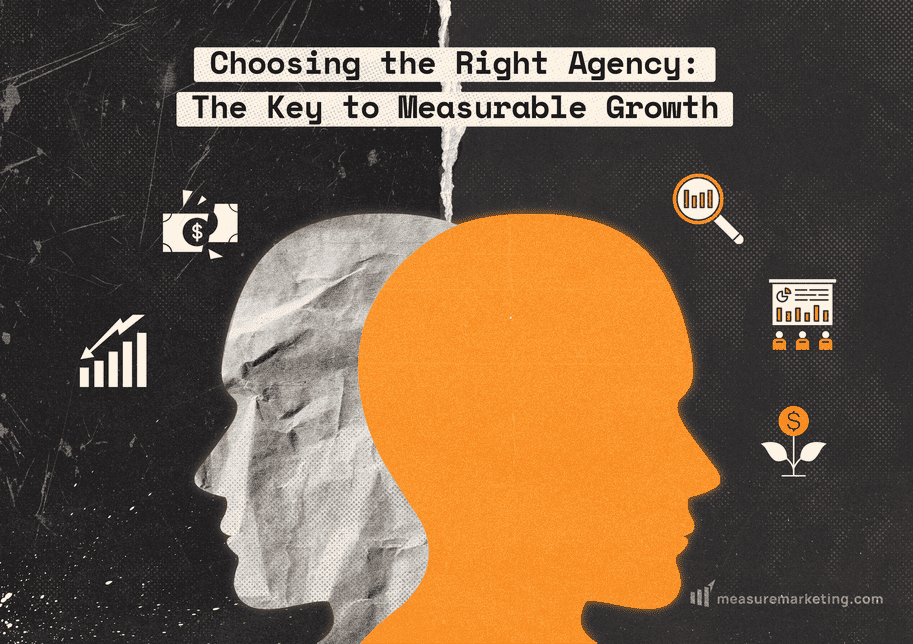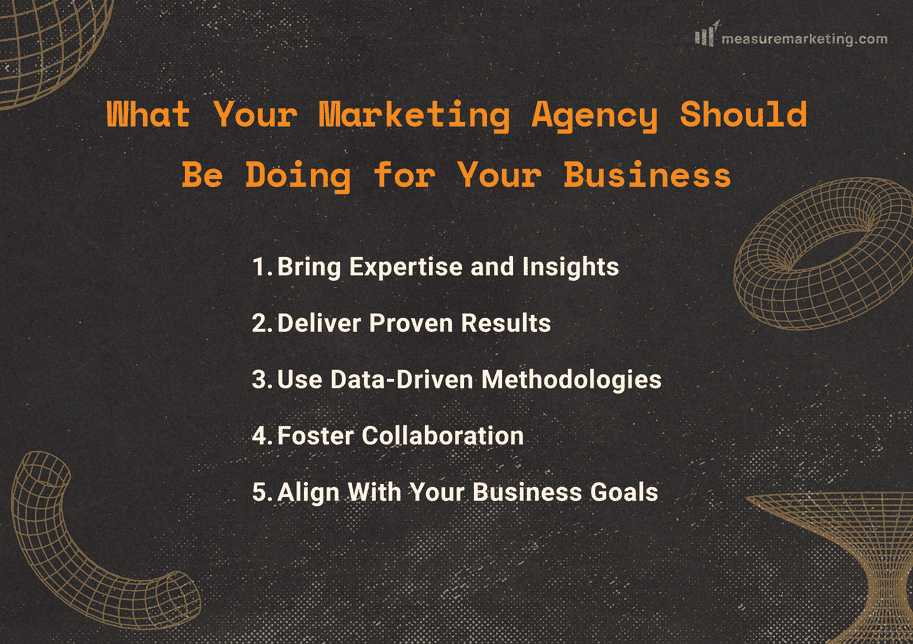8% of annual recurring revenue.
That’s the median percentage that B2B SaaS companies allocate to marketing.
For high-growth SaaS firms, this figure climbs to 14%—a significant investment that can determine a company’s trajectory of success.
In other words, for every $12 earned, at least one dollar is reinvested into marketing. Yet, despite this substantial expenditure, many companies struggle to see proportional returns.
The challenge lies in spending effectively. And that can only be achieved by partnering with the right marketing agency. Choosing the right agency can mean the difference between stagnant growth and accelerated revenue generation. The right partner will enhance brand visibility, optimize conversion rates, and drive measurable success.
However, finding an agency that genuinely aligns with your business objectives requires careful evaluation.
We’ve designed this guide to simplify your selection process and help you make informed, data-driven decisions. You’ll learn the key factors to consider—expertise, alignment, and communication—to ensure a strong return on investment and achieve your desired results.

How Do You Know if a Marketing Agency Is Right for Your Business?
Proven Track Record: Do They Deliver Tangible Results?
A track record of success is non-negotiable when hiring a marketing agency. Agencies should provide case studies of their most successful clients that showcase their ability to generate leads and drive revenue.
For example, a B2B marketing agency for manufacturing must demonstrate expertise in targeting niche industries, understanding complex supply chains, and navigating long sales cycles. On the other hand, a digital marketing agency for SaaS should exhibit proficiency in demand generation, content marketing, and account-based marketing (ABM), ensuring that strategies align with the industry’s unique customer acquisition challenges.
Look for quantifiable success metrics in their case studies, such as:
- Percentage increase in lead conversions
- Reduction in customer acquisition cost (CAC)
- Revenue growth attributed to marketing efforts
.png)
Industry Expertise: Do They Specialize in Your Market?
Choosing an agency with experience in your sector can significantly impact results. For example:
- A B2B marketing agency for cybersecurity understands compliance requirements and customer pain points better than a generalist firm.
- A go-to-market agency for tech companies is already familiar with product-led growth strategies and SaaS sales funnels.
- A B2B marketing agency for manufacturing must navigate long sales cycles and intricate supply chains.
.png)
Team Structure: Who Will Work on Your Account?
A common mistake in evaluating marketing agencies is assuming all agency employees have equal expertise. In reality, many agencies assign junior staff to execute campaigns.
Best Practice: Meet the team before signing a contract. Ensure your account will be handled by experienced strategists, not just entry-level marketers.
A well-rounded team should include:
- SEO specialists to optimize organic search visibility
- Content strategists to craft compelling narratives
- Paid media experts to drive targeted traffic
- Conversion rate optimization (CRO) specialists to improve lead conversions
.png)
What Should You Ask When Evaluating a Marketing Agency?
Do They Have a Clear and Data-Driven Methodology?
A marketing agency’s methodology speaks volumes about its ability to drive conversions.
Look for evidence of structured problem-solving in their approach:
- A deep understanding of your target audience
- Data-driven decision-making and A/B testing
- Lead nurturing strategies that move prospects through the funnel
.png)
How Do They Measure Success? (Vanity Metrics vs. Real KPIs)
Agencies focusing on likes, impressions, and clicks without tying them to revenue should raise red flags.
Key Performance Indicators (KPIs) to Look For:
- Lead-to-customer conversion rate
- Customer acquisition cost (CAC) vs. customer lifetime value (CLV)
- Return on ad spend (ROAS) and marketing-driven revenue
Pro Tip: Ask for a monthly reporting structure to ensure transparency in performance tracking.
.png)
How Can a Marketing Agency Align With Your Business Goals?
Does Their Focus Align With Your Growth Stage?
Marketing agencies have different strengths, and their focus should align with your business stage. Some excel at brand awareness, while others specialize in demand generation or account-based marketing (ABM).
Consider Your Business Stage:
- Early-Stage Growth: If you’re building brand awareness, an agency focused on content marketing and thought leadership can help establish credibility and attract organic traffic.
- Scaling and Demand Generation: If rapid growth is your goal, a performance-driven agency with expertise in paid media, lead generation, and conversion optimization is ideal.
Pivoting When Strategies Fall Short:
- Understand Your Buyer by Asking the Right Questions – Agencies should analyze your target audience’s needs, behaviors, and pain points.
- Use Insights to Design a Buyer Journey – A structured marketing funnel should include strategic touchpoints and conversion triggers.
- Enable Customer-Facing Teams to Tell Stories – Compelling narratives help prospects see the real impact of your solution.
.png)
Case Study: Fitbit’s GTM Success
Fitbit’s subscription service, Smart Coach, aimed to increase revenue, strengthen brand awareness, and boost subscription attach rates. The “Get More With Fitbit” campaign used:
- Retargeting ads
- Paid and owned media
- Push notifications
- Email newsletters
Within six months, Fitbit gained 500,000 premium subscribers and generated $192 million in revenue—a testament to a well-executed, flexible GTM strategy.
How Involved Should a Marketing Agency Be?
What Is Their Communication Style? (Partner vs. Vendor)
A true marketing partner collaborates closely with your team, ensuring alignment and strategic input rather than simply executing tasks. Clear expectations for communication and involvement are essential. Regular strategy calls, proactive updates, and data-driven insights should be standard. The right agency acts as a strategic partner, refining campaigns and adjusting strategies to meet evolving goals.
Best Practices:
- Scheduled check-ins for progress and opportunities
- Proactive recommendations aligned with business goals
- Clear campaign objectives and KPIs
.png)
Making the Right Choice
Marketing isn’t just about showing up—it’s about standing out, converting interest into action, and turning strategy into measurable success. But achieving that isn’t just about how much you spend; it’s about who you trust to guide the way.

Selecting the right marketing agency requires more than a leap of faith. It demands due diligence. The best agencies don’t just execute campaigns; they drive tangible business outcomes by:
Bringing Expertise to the Table – Your strategy isn’t in the hands of junior staff—it’s led by seasoned professionals.
Delivering Proven Results – They don’t rely on flashy metrics; they have case studies that show measurable growth.
Using Data-Driven Methodologies – Every move is backed by analytics, not guesswork.
Fostering Collaboration – They don’t just report results; they work as an extension of your team.
Aligning With Your Business Goals – Their approach fits your go-to-market strategy, not a one-size-fits-all template.
Choosing the wrong agency means wasted budget, missed opportunities, and stagnant growth. But the right agency? It becomes your growth partner, ensuring every dollar spent moves you closer to your business goals.
The Next Move is Yours
Marketing should be an engine for growth, not a gamble. Book a strategy call with MMR today and take the first step toward marketing that successfully drives measurable results.